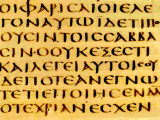I’m reading through Colossians at the moment and came across a beautiful series of topic changes in 1:16–18, part of what is traditionally referred to as the Christ Hymn. Here’s a screen shot from the Lexham Discourse Greek New Testament, a resource in Logos that’s got a number of various discourse features annotated for you. … Continue reading
Filed under Discourse Grammar …
Scholars in Press: An interview with Josh Westbury
The following interview is part of an ongoing series titled Scholars in Press, which aims to showcase a particular variety of scholars who contribute to biblical studies through their linguistic skills. BA in Theology and Biblical Languages from Houston Baptist University MDiv from Southwestern Baptist Theological Seminary MA in Biblical Languages from the University of Stellenbosch PhD in … Continue reading
Insightful words from Porter on Discourse Analysis
Posted by Kris with a K The following are not my words, they’re Porter’s (despite the lack of a quote-box, and hence the indentation). It’s a chunk of text taken from Discourse Analysis and Other Topics in Biblical Greek (1995:22-24), a volume he and D.A. Carson co-edited. I’ve almost finished reading both pieces by Porter in part … Continue reading
What goes on in a question-answer pair like this: “What’s your name? I don’t have one.”
Posted by Kris with a K If I asked you What’s your name? I’ve created the expectation that a name will be given. In terms of Information Structure, you could say I’ve established an open-proposition: a type of presupposition in which an entire statement is presupposed, except for one part that completes it. In our example, … Continue reading
Linguistics and the Greek Verb Conference Announcement!
Posted by Chris with a “C” I am very excited to announce “Linguistics and the Greek Verb: Recent Discussions and their Implications for NT Exegetes” — a Greek linguistics conference taking place in Cambridge, England, this July! The aim of the conference is to bring together NT scholars, linguists, and Classicists to discuss the Greek verbal … Continue reading
It’s nice to have Information Structure at your side: Lev 27:28, a case in point
I’m beginning a slow march through Numbers, in Hebrew; but before getting into it, I wanted to see how Leviticus segued into it. I got to 27:28 and saw word order arrangements that were full of goodies. It’s the second sentence. אַךְ־כָּל־חֵ֡רֶם אֲשֶׁ֣ר יַחֲרִם֩ אִ֨ישׁ לַֽיהוָ֜ה מִכָּל־אֲשֶׁר־ל֗וֹ מֵאָדָ֤ם וּבְהֵמָה֙ וּמִשְּׂדֵ֣ה אֲחֻזָּת֔וֹ לֹ֥א יִמָּכֵ֖ר וְלֹ֣א יִגָּאֵ֑ל … Continue reading
Jacob Cerone answers me these questions three on his recently defended thesis
I’m frankly surprised Jacob had the energy and desire to say anything more on his recently defended thesis: “A Comparative Discourse Analysis of the Masoretic and Septuagint Versions of Jonah”. Once you get to the end of a project like this, the last thing you want is to re-visit it. But Jacob was kind enough … Continue reading
Identifying the topical and focal relations in James 3:6 (or, “and THE TONGUE is a fire” versus “and the tongue IS A FIRE”)
posted by Kris (w/a “k”) 5b Ἰδοὺ ἡλίκον πῦρ ἡλίκην ὕλην ἀνάπτει· Behold how small a fire sets ablaze how great a forest! 6 καὶ ἡ γλῶσσα πῦρ And the tongue is a fire! The unmarked word order of a verbless clause is for the subject to precede the predicate, as is the case here. Natural salience is assigned … Continue reading
Lexicon Valley, Sarah Palin, & the Lexham Discourse Greek New Testament
posted by Kris (w/a “k”) Huh? What could all these have in common? In a not so recent podcast, Lexicon Valley talked about Sarah Palin’s use of demonstrative pronouns. It’s a fun listen, so definitely check it out for yourself, but here’s the blurb they give online: This, that, these, and those—the so-called demonstrative pronouns in … Continue reading
A child’s discourse: Go? Food. Bye. Papa!
posted by Kris (with a “k”) The other day I woke up and had one of the longest conversations with my one and a half year old that I’ve had yet: it consisted of four words. Dad: Wanna go get food? Kid: Go? Mom: Where are you going? Kid: Foo[d]. Kid: Bye. Kid: PAPA! This … Continue reading
Translation hiccups and Greek remedies
posted by Kris (with a “k”) Sometimes translations can be deceptive, preventing you from weaving together an argument or story how the original author presented it. But being aware of certain signposts evident in the Greek text can help you piece the text together with more sensitivity to an author’s intentions. 17Now if we are … Continue reading
Lightbulb moment with writing
posted by Kris (with a “k”) I had a random epiphany today concerning writing, specifically when high output at a consistent rate is desired. I’m finding that much of my past experience with writing has instilled various routines and inklings that aren’t always the best to carry around, depending on the style and scope of … Continue reading
Discourse Matters: Jesus, you’re so clever with your words(ing) (John 4:17)
by Kris (with a “K”) 16 Λέγει αὐτῇ· Ὕπαγε φώνησον τὸν ἄνδρα σου καὶ ἐλθὲ ἐνθάδε. 17 ἀπεκρίθη ἡ γυνὴ καὶ εἶπεν αὐτῷ· Οὐκ ἔχω ἄνδρα. λέγει αὐτῇ ὁ Ἰησοῦς· Καλῶς εἶπας ὅτι Ἄνδρα οὐκ ἔχω· 18 πέντε γὰρ ἄνδρας ἔσχες, καὶ νῦν ὃν ἔχεις οὐκ ἔστιν σου ἀνήρ· τοῦτο ἀληθὲς εἴρηκας. … Continue reading
Check out Renshaw’s interview with Steve Runge
by Kris (with a “K”) There’s a good interview up over on Brian Renshaw’s blog with Steve Runge about his recently released High Definition Commentary on Romans. So if you like Romans, Greek, Linguistics, or all of the above—check out the interview and get the scoop on this new release.
Discourse Matters: Changing topics (James 2:5)
by Kris (with a “K”) Sometimes you come to the Greek text or a commentary, or hear a pastor say: “In the Greek, this word is placed at the beginning of the sentence because the author wanted to emphasize it.” However, thanks to discourse studies (and Information Structure, in particular), we know there are multiple reasons an … Continue reading














